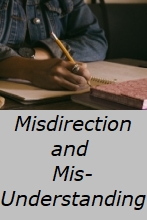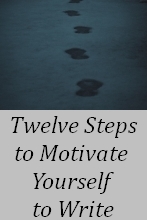Misdirection and Misunderstanding
By: Ken Brown
Published: 5/31/2021
Writing in Misdirection and Conflict

I was reading Nora Roberts Land from the Dare Valley Series this past week when I was on vacation, and I saw something that every novelist should consider in their stories.
It's a romance story / mystery. College age students are going to parties and getting sick and soon a couple of students die in what appear to be natural causes. But that isn't the story. Like I said, it's a romance and that is where the importance of misdirection and misunderstanding comes in.
What do I mean by misdirection and misunderstanding?
Misdirection
Some of your characters may be lying or at least shading the truth. Why would you want your good characters to lie? Are you thinking, "My characters are all honest except for the bad guys." Then your story won't be very interesting. Sometimes characters get pushed back against a wall by someone else and that forces them to lie to your POV character. They don't want to be dishonest, but if they aren't, something bad could happen to them, their family or even their careers.
James Scott Bell is always talking about putting your characters into positions where death is on the line. I can hear you saying, "Ken, it's a romance there isn't any death in my story." Death isn't always about a person dying. It can be death of a professional career, death of a relationship, or death of a goal. What happens if a secret comes out about your character's background or family member's experiences? What if your antagonist says, "if you don't lie to the POV character I will ruin your brother's chances for a championship or some other important goal?"
Your good guy now has to make a decision. He has to lie to the woman who is becoming the love of his life or his brother will take a fall. He loves his brother, he loves the girl, but he now is at a crossroads. He can't tell the girl about the blackmail without hurting his brother. He will misdirect the relationship.
Misunderstanding
All of the information from the previous misdirection now leads to misunderstanding. Because your good guy withheld information from the love of his life, she is now believing something that isn't true. All good stories will have this type of misunderstanding, with the expectation the POV character will find out about the lie and the relationship will be damaged by the lie.
How Many Back Handed Deals does it Take?
If it's just a little white lie, we can all still stay in happy land without any hard consequences, but you can't let that happen. Twist the screws a little tighter on your character. We want her to find out and she is devastated when the lie becomes public knowledge. "Why did he lie to me?" Come up with ten reasons for her to be smashed by the news. Make it complicated yet simple. Complicated for the lovers, but simple for the reader to understand why he lied and her life is ruined by the broken promise.
I say come up with ten, not because you have to use all of them, but so you dig deeper and make the story more interesting. The first five complications you think of are probably all cliches and it's not until you get to eight, nine and ten, that you have some amazing twists in your story.
Wrap Up.
In the middle of the second act your lovers are getting close, maybe already jumped into bed together, but the POV character doesn't know the lie yet. Then the third act starts with a bang. She hears about the lie. She gets confirmation from the "good guy" and the story heads to the climax with misunderstanding that has to be ironed out for the characters to reconcile.
Sure, it's an old formula, but it's a formula because it works. It can work for you for more than just a romance. A mystery is almost required to have misdirection and misunderstanding to make it work. The detective is hot on the trail of the bad guy and is being led in the wrong direction by another character, Suzy, who recommends the detective go after Joe. The detective can't go after Joe, because she's in love with Joe, but finds out a truth about Joe that proves he committed the crime. Why is it Joe? Why can't she believe it's him? How will Joe convince her he's not the suspect, but the other person, Suzy, committed the crime?
Misdirection and misunderstanding work. Write your story first and you can always go back and add your misdirection on the first or second edit. Where can you withhold information from your reader or force your characters to lie to make your story interesting and exciting?
Photo by Kat Stokes on Unsplash.



